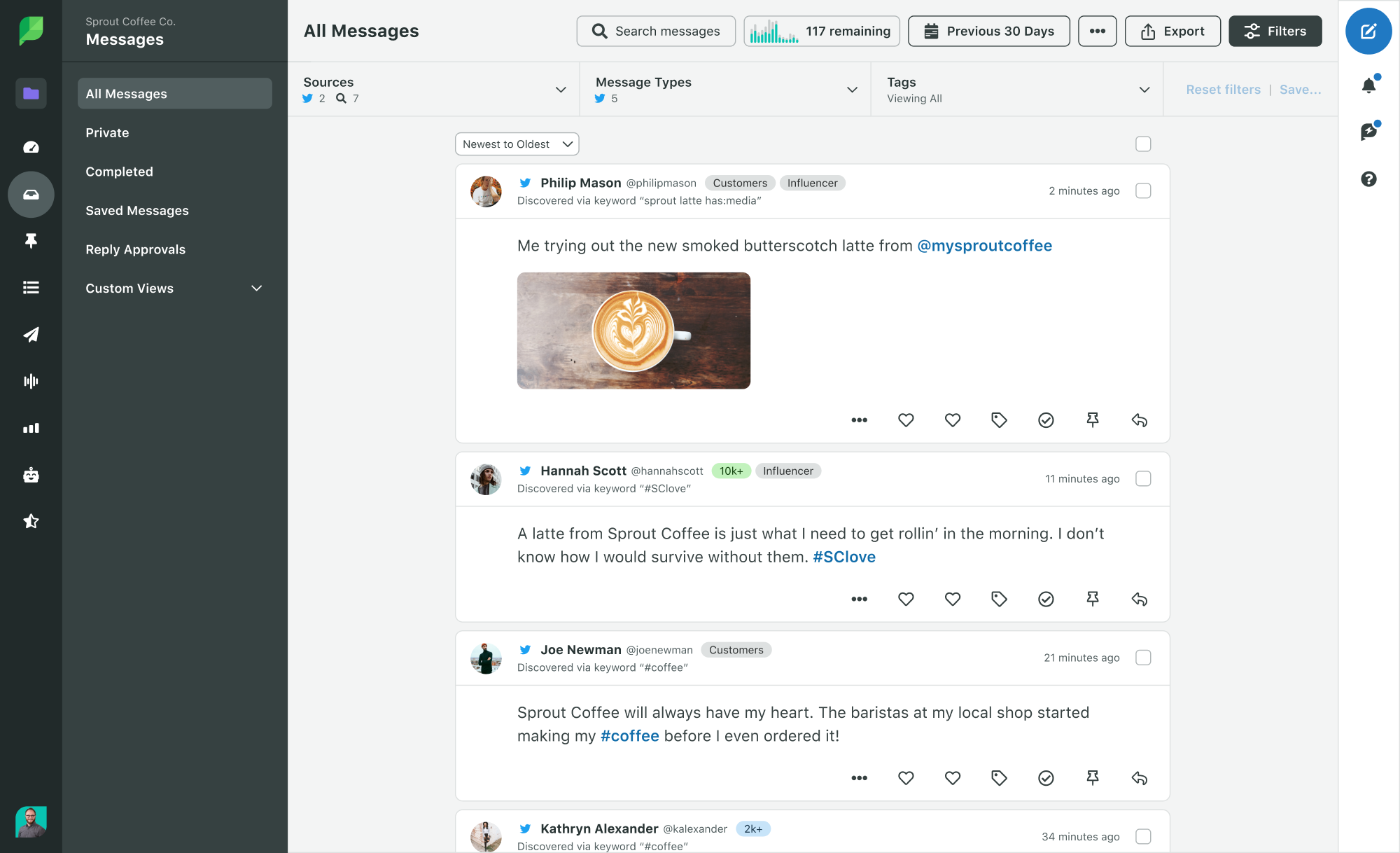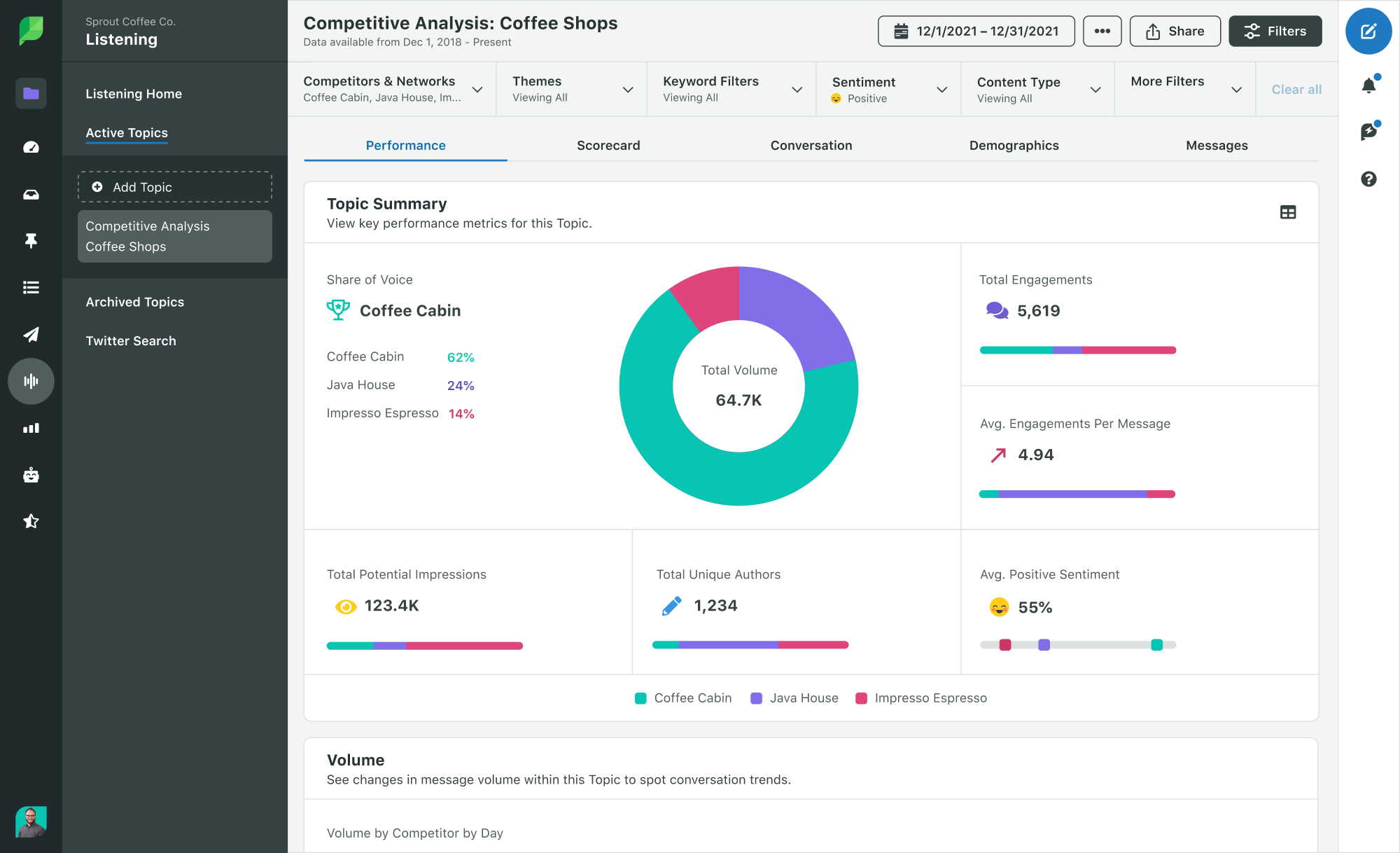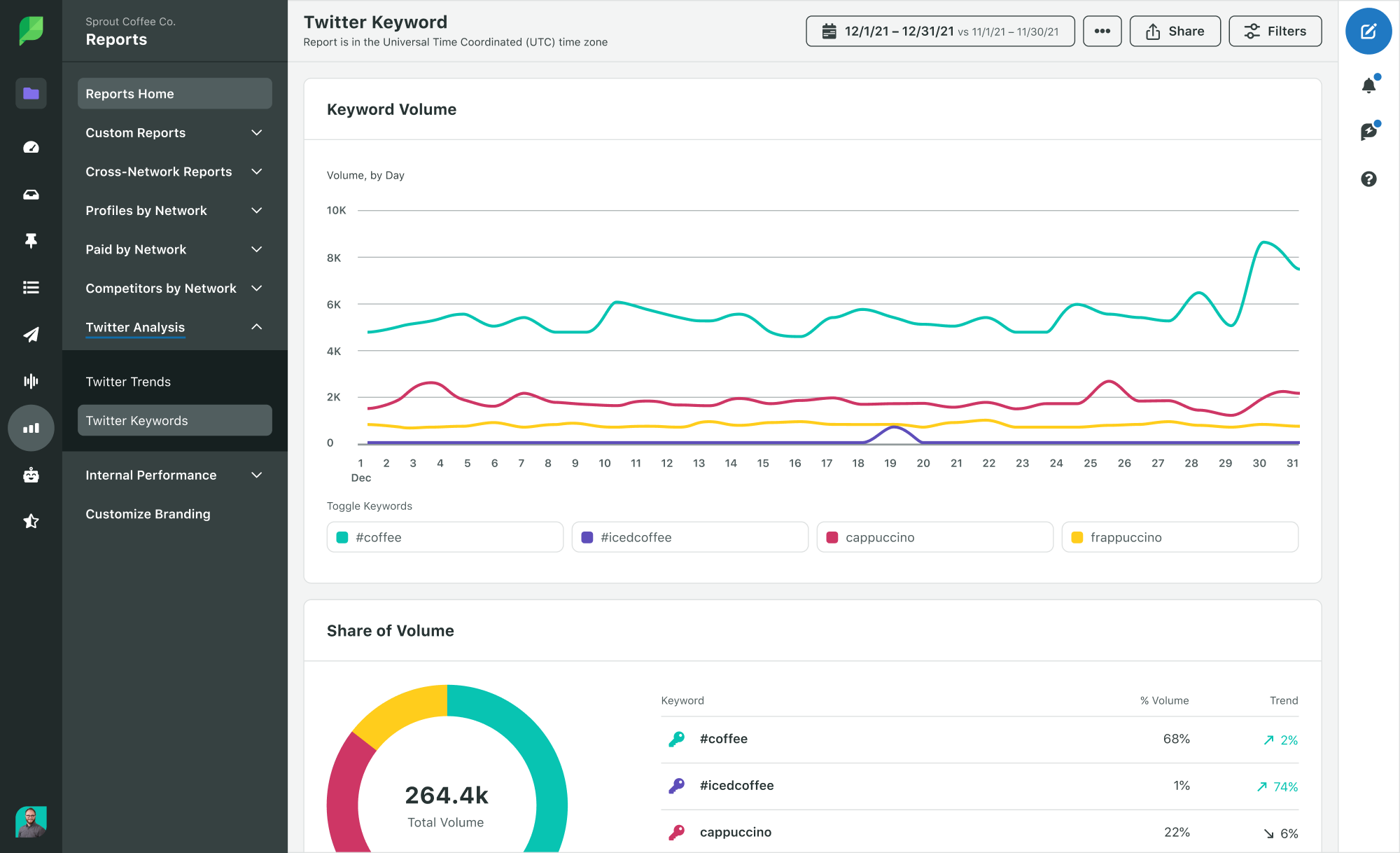Branded keywords: Why they matter and how to track them
Written by Brent Barnhart
Published on November 9, 2020
Reading time 7 minutes

Chances are you’re familiar with the concept of monitoring keywords.
From ranking in search results to figuring out how customers found out about you, keywords often represent a treasure trove of marketing data.
However, there’s a particular type of keyword that often gets overlooked.
That is, branded keywords.
Although they’re often treated as an afterthought versus @mentions and #hashtags, monitoring branded keyword conversations should be a top priority for companies today.
In this guide, we’ll break down what branded keywords are, why you need to track them and the best way to do so.
What are branded keywords, anyway?
Branded keywords are phrases directly associated with your brand, products and services. These types of keywords are discoverable through both social media and search engines.
Here’s a rundown of some of the most common types of branded keywords you’ll see in the wild.
Brand names
No surprises here. The most common types of branded keywords are literal brand names, such as:
- “Sprout Social”
- “Google”
- “Patagonia”
Mind the distinction between branded keywords, #hashtags and @mentions.
For example, someone mentioning “Sprout Social” in a tweet represents the former, while someone tagging the @SproutSocial account or using the #SproutSocial hashtag would represent the latter.
Product names (or product lines)
Here we’re talking about mentions of specific products or product lines tied to a particular brand (think: “McRib”):
- “Impossible Burger”
- “Frappuccino”
- “Pixel 4a”
And in some cases, product-related keywords might also be coupled with the brand it’s produced by (“Amazon Alexa,” for example):
- “Echo Dot”
- “Google Pixel”
- “Apple Watch”
Brand misspellings or name variations
Whether due to typos, misremembering unique brand spellings or the Mandela Effect, many branded keywords worth tracking are actually misrepresentations of the brands that they’re referencing.
For example, the term “Hydroflask” might refer to the actual Hydro Flask (@HydroFlask) brand or similar types of water bottles. Some other examples might include:
- “Camelpak” or “camel pack” (for @CamelBak)
- “Northface” (for “The North Face,” @TheNorthFace)
- “Tim Horton’s” (for @TimHortons, which cannot include an apostrophe due to character limitations)
- “Fruit Loops” (for “@FrootLoops)
Also, consider common typos such as extra spaces and swapped vowels which could impact a branded phrase (think: “Sprout Social” or “Spruot Social”). If you’re getting overwhelmed by the possibilities when it comes to these potential variations, keyword research can confirm the most common ones that people use to find your brand online.
Why branded keywords matter (and why you should track them)
Keeping track of your @mentions is a no-brainer.
Meanwhile, most brands obsess over their SEO performance and appearance in Google Search.
So why do branded keywords fly under the radar?
Food for thought: unlike @mentions or #hashtags, branded keywords on social media do not trigger notifications. This means that many brands are totally oblivious to these non-tagged interactions unless they’re name-searching themselves.
As for branded search via Google, such keywords are often of less interest to search marketers who rightfully want to rank for terms beyond their business’ name.
That said, let’s look at some key reasons why branded keywords deserve your undivided attention via social.
More opportunities for meaningful customer interactions and support
It’s no secret that people overwhelmingly use social media as a support channel.
However, not everyone that mentions you via social is necessarily going to tag you with a concern or compliment.
Perhaps they’re venting. Maybe they’ve tagged the wrong brand or simplify forgot to tag you at all.
Either way, having a pulse on your branded keywords means that you’ll never miss opportunities to interact with customers.
chewy has the best customer service i swear. we accidentally ordered the wrong sized crate for poppy, so i messaged them asking if we could return it. they said that they'd give us a refund and to give it to a local pet shelter 🥺
— ੈ♡˳·˖✶ ☁️ katie (@westernhaiku) October 26, 2020
More comprehensive competitive analysis
Brand-related phrases are an underrated tool to not only spy on your competitors but also see how your reputation stacks up to others in your space.
Again, not everyone on social media is going to tag you. Conversations happen organically and unfiltered. That’s actually the beauty of social media: you can see the authentic thoughts of your target audience.
By keeping an eye on branded keywords for both yourself and your competitors, you can hone in these off-the-cuff conversations with ease.
I don’t do it for personal use, but we love Sprout Social for work.
— Cherrelle Nicholson (@CherreNicholson) October 20, 2020
Beyond social media, brand-specific keywords can help you better understand the search presence and ad strategies of your competitors.
For example, searching branded keywords related to researching a product can help highlight search ads that your competitors are running. These might include terms such as:
- [brand name] alternatives
- [brand name] competitors
- [brand name] reviews
Plus, these searches let you take a peek at how your competitors stack up when it comes to shout-outs from industry blogs or news outlets.

A better understanding of customer sentiment
Share of voice and customer sentiment are two of the most important social media metrics to track.
Share of voice represents how much people are talking about you versus your competitors or competing products. Meanwhile, customer sentiment is the measure of positive versus negative comments from your followers.
Again, branded keywords help highlight shout-outs, compliments and criticism that you otherwise might not see. The more mentions you’re able to monitor, the more holistic view you have of your social presence.
https://twitter.com/kenndeb_/status/1320503936193863680
How to track branded keywords (the old-fashioned way)
Tracking brand keywords means looking at more than your notifications.
Monitoring such phrases is a cinch if you’re using a tool such as Sprout Social’s listening suite.
But before we get into that, let’s look at two older-school strategies that work.
Tracking via Google
If you’re primarily concerned with branded keywords in search engines, Google has a couple of tools to help.
For example, you can set up notifications in Google Alerts to inform you of brand mentions in blogs and other online discussions. This is more efficient than just Googling your brand name all the time. 
You can also monitor your Google Analytics or other SEO tools to see how many branded queries are leading customers to your website. Additionally, you can see whether competing branded keywords are driving traffic as well.
Tracking via Twitter
Twitter is arguably the best platform to track branded keywords on social media.
Not only is it a popular and accessible channel for customer service but Twitter’s advanced search makes the process much easier.
Through advanced search, you can punch in multiple keywords of interest as well as exact-match variants of them. The fact that you can search for multiple terms at once is a time-saver.

Unfortunately, trying to find branded keywords on Facebook or LinkedIn is somewhat of a slog. Doing so is pretty much impossible on Instagram considering the platform only allows you to search hashtags.
Of course, you can overcome all of these hurdles by using a tool like Spout.
Speaking of which…
The best way to track branded keywords (with Sprout!)
Let’s say you have your list of keywords and phrases in mind.
With Sprout Social, you can search for branded keywords across multiple social channels and monitor mentions within a single platform.
Once you start tracking your keywords, you can then populate them in your social media reporting. For example, you can track your #hashtag campaigns and branded keywords at the same time. This is a great fit for tracking the performance of specific product mentions alongside a campaign that promotes those items.

Below is what the results look like in Sprout’s Smart Inbox. An added bonus is that you can reply directly to queries and comments without having to leave Sprout. For example, you can respond to a customer question on Instagram while thanking someone for a shout-out on Twitter side-by-side.

You can dive deeper into conversations about and around your brand by using Sprout’s social listening features. Using our Query Builder, you can put together your list of exact match or variant phrases to watch via social listening. It’s easy to add and remove terms accordingly.

If you’re interested in seeing how many non-tagged mentions your brand gets, listening queries can uncover mentions of variants of your brand name, products and campaigns.

In addition to mentions, Sprout allows you to create reports based on your keywords’ performance.
What else can I do with my branded keyword data?
To wrap things up, we’ll break down how you can translate your keyword into action and inform future marketing decisions.
Highlight your share of voice versus your competitors
Sprout’s social listening features present a comprehensive competitive analysis that highlights the following metrics in one place:
- Share of voice (your competitors’ mentions versus your own)
- Total engagements and average engagements per message
- Total impressions
- Average positive sentiment

Based on these numbers, you can determine your own reach versus your competitors. You can likewise see whether or not customers see you in a more positive light over time.
Uncover more conversations with customers
So much of tracking branded keywords is about uncovering opportunities to talk to your customers.
Because Sprout tracks hashtags and branded keywords in one place, you never have to worry about missing a conversation or jumping between reports. With our reporting, you have a more holistic view of your customer interactions.

This report can highlight which keywords are driving the most conversations and how well your brand is doing when it comes to encouraging interactions.
And with that, we wrap up our guide!
Are you making the most of your branded keywords and mentions?
If you want the most comprehensive view of your customer interactions and reputation possible, tracking branded keywords is an absolute must-do.
Our suite of listening and monitoring tools simplify the process. Setting up keyword tracking and reporting is simple for beginners and can be done in no time flat.
Want to see for yourself? Take a test-drive of all the awesome monitoring features baked in Sprout Social by requesting a demo today.
- Categories
31 free social media templates that will elevate your workflows
Published on April 25, 2024 Reading time 12 minutes - Categories
54 answers to the most common social media questions
Published on April 22, 2024 Reading time 14 minutes - Categories
Target audience: What it is and how to find yours
Published on March 27, 2024 Reading time 8 minutes


Share